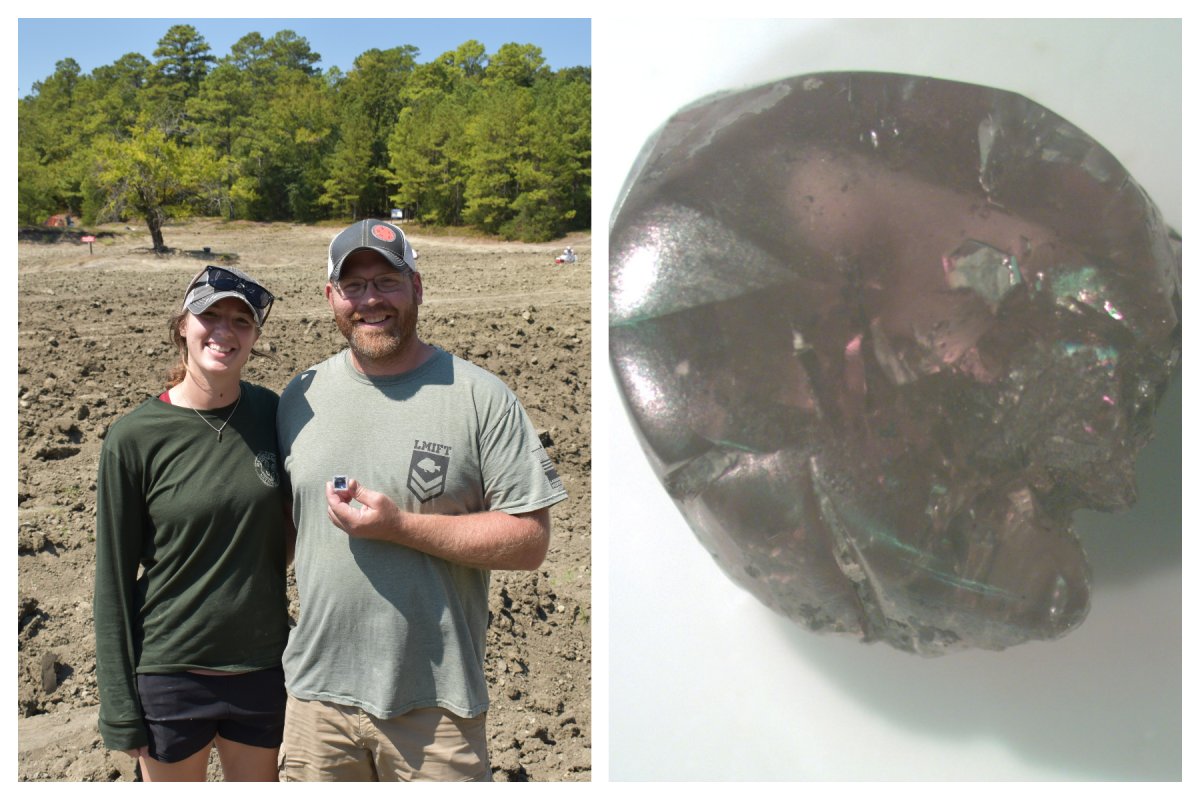A couple visiting a state park in Arkansas for their anniversary stumbled across an enormous diamond.
Jessica and Seth Erickson, from Chatfield in Minnesota, visited Arkansas's Crater of Diamonds State Park as part of a multi-state road trip for their 10th anniversary. According to a statement from Tayler Markham, a park interpreter at Arkansas State Parks, they spent the morning of November 4 digging and sifting through the soil of the park, and spotted a gem the color of iced tea.
The couple then took the gem to the park's Diamond Discovery Center, where staff registered it as a 1.90-carat brown diamond.

Crater of Diamonds State Park is situated about 60 miles east of the Arkansas-Oklahoma border. It's the only public diamond mine in the world where people can come specifically to hunt diamonds at their original source.
"Diamond State Park is a lamproite, a volcanic rock that together with kimberlites is a common host for diamonds. These rapid eruptions bring material from tens of kilometers depth to the surface, including diamonds, Nicolas Flament, a geologist and geophysicist at the University of Wollongong in Australia, told Newsweek.
"The state park is conveniently located in a geologically interesting area. The park hosts a volcanic pipe," said Denis Fougerouse, a structural and economic geologist at Curtin University in Australia.
"These 'pipes' are ancient volcanoes, 95 million years old at Diamond State Park. Some types of volcanoes, kimberlite and lamproite pipes can bear diamonds. These types of volcanoes are sourced deep in the Earth's mantle; that's where diamonds can form. Diamond bearing kimberlite and lamproite are relatively rare and we have found only 60 (/7000) economically viable pipes across the world," he told Newsweek.
Finding diamonds at the 37.5-acre park is therefore surprisingly common: according to the park website, one or two are found each day, with 581 diamonds having been registered in 2022 so far, and over 33,100 diamonds having been found since 1972 when the park opened.
The 40.23-carat Uncle Sam, the largest diamond ever unearthed in the U.S., was found at this same park in 1924.
"The vast majority are small (less than one carat), so the larger the diamond the rarer the find. Quality and color may vary as well," a spokesperson from the Arkansas Department of Energy and Environment's Geological Survey, told Newsweek. "Since the volcanic pipe's emplacement, the area has been subjected to erosion, scattering the diamonds. Now that the area is a park, it is plowed periodically to control vegetation and expose fresh ground."
According to the Arkansas Department of Energy and Environment's Geological Survey, there have been a few attempts to commercially mine the site, but all have failed.
However, the couple finding this size of diamond, and a colored one at that, is a very rare occurrence.
"A one in a million stone is 1-carat in weight, and one in 15 million is 2 carat," Flament said.
"Diamonds over 1 carat are less than 3 percent of those found at the Crater, which makes this a very rare and special find," Jim Houran, a diamond collector and regular at the park, told Newsweek.
When refined and cut, a clear 1.9 carat diamond is worth an average price of $24,666. However, a lot of the diamond's weight is lost in the cutting process, and the price will also vary with color.
Luckily for the couple, if you find a gem at the park, you can keep it, and are even allowed to name their stone. The Ericksons chose to name theirs HIMO, after the initials of each of their children.
Do you have a tip on a science story that Newsweek should be covering? Do you have a question about finding diamonds? Let us know via science@newsweek.com.
Uncommon Knowledge
Newsweek is committed to challenging conventional wisdom and finding connections in the search for common ground.
Newsweek is committed to challenging conventional wisdom and finding connections in the search for common ground.
About the writer
Jess Thomson is a Newsweek Science Reporter based in London UK. Her focus is reporting on science, technology and healthcare. ... Read more
To read how Newsweek uses AI as a newsroom tool, Click here.








